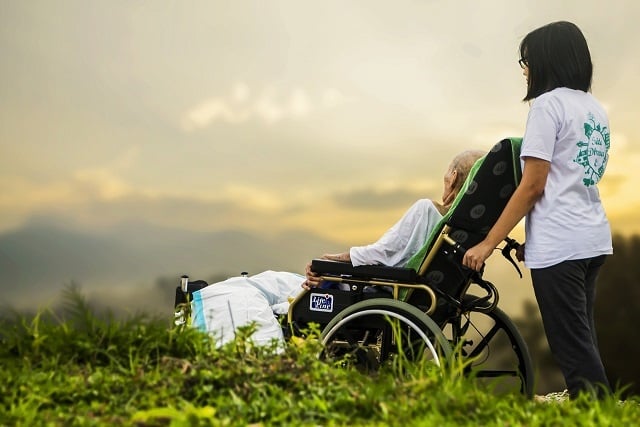Updated December 2025
Caring effectively and compassionately for seniors is an issue that touches every single one of us. Either we have a loved one who needs care, or we ourselves are facing the facts of growing old.
With populations of seniors skyrocketing across the globe, elder care is one of the most important health care and policy issues of our time. Demand is high for gerontology professionals, particularly front-line people who give direct support to aging community members.
But working in this field comes with a very special set of challenges. Older patients have unique needs—needs that often go unnoticed by health care providers and unfulfilled by local resources.
Working closely with the elderly can be incredibly rewarding, but you will need to develop a special skillset to succeed in this career. Take a look at some of the top challenges facing today's senior caregivers, and how gerontology training can help.
1. Understanding common mental health issues for seniors
Most people grasp the obvious physical implications of aging. We understand the gradual loss of strength and stamina, susceptibility to colds and flu, and common diseases like diabetes, arthritis, and Parkinson's.
But what about mental health? According to the Mental Health Commission of Canada, one-third of seniors who live on their own report a need for mental health care, and 12 per cent have experienced social isolation.
Caregivers face the challenge of recognizing and addressing mental health issues like these. They need information on causes, treatments, prevention, and symptoms—and strategies for supporting clients and their families.
2. Promoting a healthy lifestyle & social inclusion
It is well documented that social isolation can negatively impact both physical and mental health. Did you know that feelings of loneliness and disconnection from peers are associated with a wide range of health problems? These include:
- Depression
- Infection
- Cognitive decline
- Dementia
- Elevated blood pressure
- Morbidity
These risk factors are even greater among older populations, who are far more likely to suffer from isolation and loneliness. In many cases, seniors have less mobility, fewer close friendships, and limited opportunity to engage with their community.
A major goal for caregivers is to overcome these challenges and ensure their clients feel connected with the outside world in meaningful ways.
A good gerontology course offers practical solutions for promoting a healthy, socially active lifestyle—such as community resources and activity ideas for seniors, and ways to motivate disengaged clients.
Staying active and maintaining positive relationships is fundamental to good health, particularly for elderly people.
Caregivers must develop strategies for social inclusion that can be adapted to clients in various states of health, mobility, and enthusiasm.
3. Being sensitive to the aging process
What is it like to grow old? How does it feel to slowly lose your independence, develop chronic medical issues, and have treasured friends pass away? These are all deeply important questions to consider if you work closely with seniors.
One of the key goals of effective gerontology training is to help students truly understand and empathize with the realities of aging. There are practical sides to this issue, such as common illnesses seniors face, and typical difficulties performing the tasks of daily living.
However, there are other, more complex dimensions of aging caregivers must strive to understand—such as the psychological impact of isolation, and how people from different cultural and religious backgrounds view their role as seniors in society.
When working with seniors, health care providers must consider how aging impacts overall quality of life. How does your client's sense of personal identity change after retirement? How is their relationship with loved ones impacted by aging?
Being sensitive to the unique challenges seniors face, as they undergo the physical, emotional, and social transformations of aging, is crucial for providing effective, compassionate care.
4. Facing death and loss
Caregivers who work with elderly clients come face-to-face with death on a fairly regular basis. But it's never easy to lose a client you've become close to.
This is a major challenge for people who specialize in geriatrics, and it must be acknowledged.
Professionals in this field need a range of self-care techniques they can use to deal with loss in healthy ways—and the understanding that to feel distraught or stressed out in these circumstances is normal.
Your job is to connect with your clients, gain their trust, and form positive relationships. When that person dies, letting go of the bond you've created can be very difficult.
From sitting down with a grief counsellor to simply taking a day off to spend with friends, even experienced caregivers often need special support in this area.
5. Coping with ethical and legal issues
Not only must caregivers deal with emotional issues around death, but also the legal and ethical implications of caring for a dying patient.
Who should make decisions if your client is impaired? How is capacity assessed, and what should you know about consent? What about medically assisted dying?
Anyone who works closely with the elderly should have a firm grounding in these matters. You need to know the law where you live, your role in the process, and how to make a plan for end-of-life care.
Quality gerontology training covers these legal aspects (and ethical questions) so caregivers are better equipped to handle what is already an emotionally volatile situation.
Interested in learning more?
We welcome you to explore our online gerontology certificate. This course is taught by experienced health care professionals and can be completed at your own pace, between three and six months.
Click below for complete program details and chat live with an admissions advisor. We're here to help!








